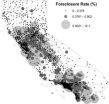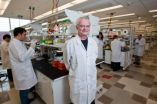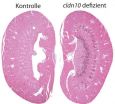(Press-News.org) RIVERSIDE, Calif. — California neighborhoods reeling from record foreclosures also experienced lower levels of voter turnout in the 2008 presidential election, according to researchers at the University of California, Riverside.
Voters who lost their homes were not the only ones who appear to have been affected, sociologist Vanesa Estrada-Correa and political scientist Martin Johnson determined in a study believed to be the first to assess the effect of foreclosure on political participation. Voters who remained in neighborhoods impacted by foreclosure were less likely to vote than individuals in more stable communities, the researchers discovered.
The findings of Estrada-Correa and Johnson appear in "Foreclosure Depresses Voter Turnout: Neighborhood Disruption and the 2008 Presidential Election in California," published in the peer-reviewed journal Social Science Quarterly and available online. The journal is published by the Southwestern Social Science Association.
Nationally more than 3.5 million families were dislocated by foreclosures in 2008. In California, nearly 641,000 homes were lost to foreclosure between the first quarter of 2008 and the first quarter of 2011. Communities in the Inland Empire in Southern California and the Central Valley were hit especially hard. People of color and low-income homeowners were more likely to experience foreclosure.
Estrada-Correa and Johnson examined foreclosure data and voter-turnout records by ZIP code, controlling for factors such as poverty, ethnicity and proportion of neighborhood residents with a four-year college degree. They found that in communities with a large proportion of residents displaced by foreclosure even the neighbors who remained in their homes were less likely to cast ballots.
"Neighborhoods affect the political participation of their residents," the scholars wrote. "Other things being equal, individuals are more likely to vote when they live in places where neighbors vigorously participate in politics, while individuals are less likely to vote when their neighbors are less civically active. Given that foreclosure creates instability in communities, areas that experience higher levels of foreclosure have lower voter turnout."
A body of research on voter turnout has found that homeowners are more likely to go to the polls than renters, and people who have lived in their homes for longer periods of time have a much higher turnout rate than people who have only lived in their current residence for a short period of time. That trend holds true among residents of high- and low-income neighborhoods.
The issue is not only one of an involuntarily mobile electorate facing challenges of reregistering at a new address or with no address — courts have ruled that even a park bench can serve as a lawful address for voter registration, the researchers said, citing Maria Foscarinis, executive director of the National Law Center on Homelessness and Poverty. Foscarinis points out that "as a practical matter, registering, holding on to your documents and even focusing on your civic rights and duties may be impossible when basic survival needs are at stake."
Foreclosure disrupts neighborhoods both by removing invested members of the community, as well as exposing others who remain in the neighborhood to economic anxieties, Estrada-Correa and Johnson wrote. "These anxieties take the form of feelings of direct, personal exposure to foreclosure, as well as uncertainties about housing values in the neighborhood, which fall as homes empty and the loans supporting them revert to financial institutions and other lenders. The process depreciates trust."
Estrada-Correa and Johnson said they plan to continue their research beyond the 2008 general election to examine political engagement in other elections that occurred during the housing crisis. They also hope to examine the connection between declines in voter turnout due to foreclosure and patterns of inequality in political disenfranchisement based on income, female-headed households, and race and ethnicity of borrowers and their exposure to subprime lending and home foreclosure.
"Foreclosure has been unequally distributed and is particularly high among populations already less likely to be politically active: young, minority, moderate-income families," they said.
"We expect the 2012 election will reveal even more about the cumulative impact of neighborhood change resulting from the past five years of economic crisis," Estrada-Correa said.
In the run-up to the 2012 presidential election, Johnson observed, "a great deal of attention has been paid to revisions to election laws such as requiring voters to have identification cards and reduced opportunities for voters in some states to cast early and absentee ballots. But more subtle economic and social processes may also introduce barriers to political participation."
INFORMATION:
The study was supported, in part, by the UCR College of Humanities, Arts and Social Science Chancellor's Strategic Investment Fund as well as the UC Humanities Research Institute's California Studies Consortium.
Foreclosures impact California voter turnout
UC Riverside researchers find that even residents who remained in neighborhoods heavily impacted by the housing crisis were less likely to vote in the 2008 presidential election
2012-08-23
ELSE PRESS RELEASES FROM THIS DATE:
Underground solution to starving rice plants
2012-08-23
Scientists have pinpointed a gene that enables rice plants to produce around 20% more grain by increasing uptake of phosphorus, an important, but limited, plant nutrient.
The discovery unlocks the potential to improve the food security of rice farmers with the lowest value phosphorus-deficient land allowing them to grow more rice to add to global production, and earn more.
The gene – called PSTOL1 which stands for Phosphorus Starvation Tolerance – helps rice grow a larger, better root system and thereby access more phosphorus. Farmers can apply phosphorus fertilizers ...
The Milky Way now has a twin (or 2)
2012-08-23
Research presented today at the International Astronomical Union General Assembly in Beijing has found the first group of galaxies that is just like ours, a rare sight in the local Universe.
The Milky Way is a fairly typical galaxy on its own, but when paired with its close neighbours - the Magellanic Clouds - it is very rare, and could have been one of a kind, until a survey of our local Universe found another two examples just like us.
Astronomer Dr Aaron Robotham, jointly from the University of Western Australia node of the International Centre for Radio Astronomy ...
New insights into why humans are more susceptible to cancer and other diseases
2012-08-23
Chimpanzees rarely get cancer, or a variety of other diseases that commonly arise in humans, but their genomic DNA sequence is nearly identical to ours. So, what's their secret? Researchers reporting in the September issue of the American Journal of Human Genetics, a Cell Press journal, have found that differences in certain DNA modifications, called methylation, might play a role.
The researchers discovered hundreds of genes that display different patterns of methylation between the two species. These different patterns of methylation lead to different levels of expression, ...
'Naked Darth Vader' approach could tame antibiotic resistant superbugs
2012-08-23
Rather than trying to kill bacteria outright with drugs, Université de Montréal researchers have discovered a way to disarm bacteria that may allow the body's own defense mechanisms to destroy them. "To understand this strategy one could imagine harmful bacteria being like Darth Vader, and the anti-virulence drug would take away his armor and lightsaber," explained Dr. Christian Baron, the study's lead author and Professor at the Department of Biochemistry. "A naked Darth Vader would be an easy target and similarly, pathogenic bacteria without their virulence factors would ...
Histone-modifying proteins, not histones, remain associated with DNA through replication
2012-08-23
PHILADELPHIA—It's widely accepted that molecular mechanisms mediating epigenetics include DNA methylation and histone modifications, but a team from Thomas Jefferson University has evidence to the contrary regarding the role of histone modifications.
A study of Drosophila embryos from Jefferson's Department of Biochemistry and Molecular Biology published ahead of print in Cell August 23 found that parental methylated histones are not transferred to daughter DNA. Rather, after DNA replication, new nucleosomes are assembled from newly synthesized unmodified histones.
"Essentially, ...
Study reveals human drive for fair play
2012-08-23
People will reject an offer of water, even when they are severely thirsty, if they perceive the offer to be unfair, according to a new study funded by the Wellcome Trust. The findings have important implications for understanding how humans make decisions that must balance fairness and self-interest.
It's been known for some time that when humans bargain for money they have a tendency to reject unfair offers, preferring to let both parties walk away with nothing rather than accept a low offer in the knowledge that their counterpart is taking home more cash.
In contrast, ...
Therapeutic avenues for Parkinson's investigated at UH
2012-08-23
HOUSTON, Aug. 23, 2012 – Scientists at the University of Houston (UH) have discovered what may possibly be a key ingredient in the fight against Parkinson's disease.
Affecting more than 500,000 people in the U.S., Parkinson's disease is a degenerative disorder of the central nervous system marked by a loss of certain nerve cells in the brain, causing a lack of dopamine. These dopamine-producing neurons are in a section of the midbrain that regulates body control and movement. In a study recently published in the Proceedings of the National Academy of Sciences (PNAS), ...
Gene 'switch' may explain DiGeorge syndrome severity
2012-08-23
The discovery of a 'switch' that modifies a gene known to be essential for normal heart development could explain variations in the severity of birth defects in children with DiGeorge syndrome.
Researchers from the Walter and Eliza Hall Institute made the discovery while investigating foetal development in an animal model of DiGeorge syndrome. DiGeorge syndrome affects approximately one in 4000 babies.
Dr Anne Voss and Dr Tim Thomas led the study, with colleagues from the institute's Development and Cancer division, published today in the journal Developmental Cell.
Dr ...
New insights into salt transport in the kidney
2012-08-23
Sodium chloride, better known as salt, is vital for the organism, and the kidneys play a crucial role in the regulation of sodium balance. However, the underlying mechanisms of sodium balance are not yet completely understood. Researchers of the Max Delbrück Center for Molecular Medicine (MDC) Berlin-Buch, Charité – Universitätsmedizin Berlin and the University of Kiel have now deciphered the function of a gene in the kidney and have thus gained new insights into this complex regulation process (PNAS Early Edition, doi/10.1073/pnas.1203834109)*.
In humans, the kidneys ...
Cloud control could tame hurricanes, study shows
2012-08-23
They are one of the most destructive forces of nature on Earth, but now environmental scientists are working to tame the hurricane. In a paper, published in Atmospheric Science Letters, the authors propose using cloud seeding to decrease sea surface temperatures where hurricanes form. Theoretically, the team claims the technique could reduce hurricane intensity by a category.
The team focused on the relationship between sea surface temperature and the energy associated with the destructive potential of hurricanes. Rather than seeding storm clouds or hurricanes directly, ...
LAST 30 PRESS RELEASES:
Next-generation CAR-T designs that could transform cancer treatment
As health care goes digital, patients are being left behind
A clinicopathologic analysis of 740 endometrial polyps: risk of premalignant changes and malignancy
Gibson Oncology, NIH to begin Phase 2 trials of LMP744 for treatment of first-time recurrent glioblastoma
Researchers develop a high-efficiency photocatalyst using iron instead of rare metals
Study finds no evidence of persistent tick-borne infection in people who link chronic illness to ticks
New system tracks blockchain money laundering faster and more accurately
In vitro antibacterial activity of crude extracts from Tithonia diversifolia (asteraceae) and Solanum torvum (solanaceae) against selected shigella species
Qiliang (Andy) Ding, PhD, named recipient of the 2026 ACMG Foundation Rising Scholar Trainee Award
Heat-free gas sensing: LED-driven electronic nose technology enhances multi-gas detection
Women more likely to choose wine from female winemakers
E-waste chemicals are appearing in dolphins and porpoises
Researchers warn: opioids aren’t effective for many acute pain conditions
Largest image of its kind shows hidden chemistry at the heart of the Milky Way
JBNU researchers review advances in pyrochlore oxide-based dielectric energy storage technology
Novel cellular phenomenon reveals how immune cells extract nuclear DNA from dying cells
Printable enzyme ink powers next-generation wearable biosensors
6 in 10 US women projected to have at least one type of cardiovascular disease by 2050
People’s gut bacteria worse in areas with higher social deprivation
Unique analysis shows air-con heat relief significantly worsens climate change
Keto diet may restore exercise benefits in people with high blood sugar
Manchester researchers challenge misleading language around plastic waste solutions
Vessel traffic alters behavior, stress and population trends of marine megafauna
Your car’s tire sensors could be used to track you
Research confirms that ocean warming causes an annual decline in fish biomass of up to 19.8%
Local water supply crucial to success of hydrogen initiative in Europe
New blood test score detects hidden alcohol-related liver disease
High risk of readmission and death among heart failure patients
Code for Earth launches 2026 climate and weather data challenges
Three women named Britain’s Brightest Young Scientists, each winning ‘unrestricted’ £100,000 Blavatnik Awards prize
[Press-News.org] Foreclosures impact California voter turnoutUC Riverside researchers find that even residents who remained in neighborhoods heavily impacted by the housing crisis were less likely to vote in the 2008 presidential election


